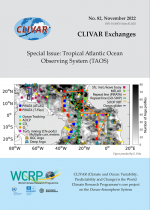GEWEX Convection-Permitting Climate Modeling Meeting
The GEWEX Convection-Permitting Climate Modeling Meeting will focus on scientific and technical challenges related to convection-permitting climate modeling (horizontal grid spacing ≤4 km). These challenges include the model setup, observational datasets, evaluation techniques, computational resources, model intercomparisons, and the use of convection-permitting simulations in impact research. The 3-day meeting's aim is to foster collaborations and synergies to work on this challenging topic as a community. There will be oral and poster sessions, several invited talks on key topics, and multiple opportunities for discussions and networking.
Applications Open through June 15.
Participants will be notified in early July.
Agenda:
Sessions:
There will be oral and poster sessions on the following topics.
S1: Scientific analysis of convection-permitting climate simulations
- spatiotemporal scales of added value
- differences in climate change signals compared to coarser-resolution climate simulations
- high intensity climate extremes
- scale interactions between small-scale and large-scale features (upscaling of added value)
- feedback processes (e.g., soil-moisture precipitation feedback)
- assessing uncertainties with convection-permitting models
S2: Model setup in convection-permitting climate simulations
- simulating turbulence in the gray zone
- surface atmosphere interactions and PBL schemes
- radiation and microphysics
- shallow convection
- scale aware parameterization schemes
- sensitivities of model results to horizontal and vertical resolution
S3: Observational datasets and advanced evaluation techniques
- high resolution observational datasets
- effects of observational uncertainties on model evaluation
- process based evaluation techniques
- evaluation of spatiotemporal bias characteristics
- instrument simulators for a direct comparison with remote sensing instruments (e.g., satellite or ground based radars)
S4: Using convection-permitting climate simulations in impact research
- Hydrological modeling and flood forecasting
- Aviation
- Wind energy
- Urban modeling
S5: Big-Data and future high-performance computing
- Climate modeling on next generation high-performance computers
- Data storage and analysis
- Making data accessible to the research community
- Online evaluation of model simulations
In addition there will be discussion breakout sessions on specific topics. The topics will be announced soon.













